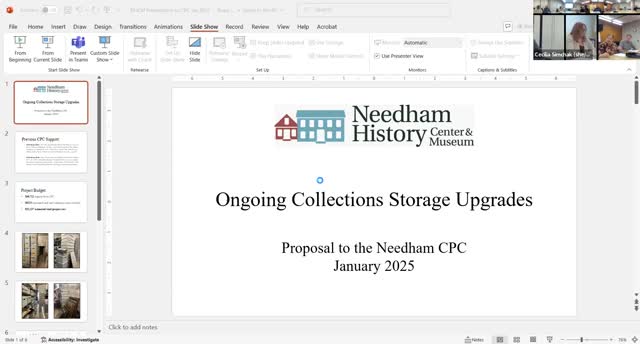Needham History Center seeks CPC funds for archival shelving and storage supplies
Get AI-powered insights, summaries, and transcripts
Subscribe
Summary
The Needham History Center asked the Community Preservation Committee on Jan. 8 for funding to buy modular shelving, archival boxes and related supplies to improve storage, access and preservation of the town’s historical collections.
Gloria Grice, executive director of the Needham History Center, asked the Needham Community Preservation Committee (CPC) on Jan. 8 for funding to upgrade the organization’s storage and shelving to better preserve and make accessible the town’s historical collections.
Grice told the committee the center is requesting $67,712 for supplies identified in the proposal and is including an additional $8,500 for staff and volunteer costs listed in the application. She said previous CPC grants supported initial steps: a 2012 grant to hire a collections manager and buy startup supplies, and additional CPC support in 2018 to continue rehousing and inventory work. "CPC kindly provided funding to hire a collections manager to support her salary for a few years and also to purchase the various initial supplies," Grice said.
The request is intended to replace existing shelving with heavy-duty modular racks sized to fit archival boxes more efficiently, to install frame racks for paintings and to move collections off the floor. Grice described the current storage as crowded: banker-style shelving from a school renovation holds just two boxes per shelf and boxes are often stacked in aisles. The proposed shelving would allow "from 8 to 12 boxes per shelf" in the same footprint, she said, and would make routine inspections and pest monitoring possible.
Grice said the storage area is insulated and has a vapor barrier added to protect collections but that past roof damage required emergency repairs that strained the history center’s capital reserve. The center also emphasized public access and outreach as reasons for the project: Grice said the center runs outreach programs for town schools and that "every third grader in town comes through that program" at no charge. She added that the center does not charge for research and strives to make materials available to the public.
Committee members asked technical questions about the proposed archival standards and whether the project adheres to the CPC’s preservation requirements. Grice cited the CPC bylaw requirement that historic preservation projects follow Department of the Interior standards and described the DOI guidance as an aspirational manual the center is incrementally moving toward. She also said the History Center expects an affirmative vote from the Historic Commission confirming the collection’s relevance; that vote was scheduled for the Monday following the Jan. 8 meeting and Grice said she would forward the result to the CPC.
No formal vote was taken on Jan. 8. Committee members thanked the presenters and discussed scheduling and next steps, including closure of outstanding questions and confirmation of the Historic Commission vote prior to further CPC action.
